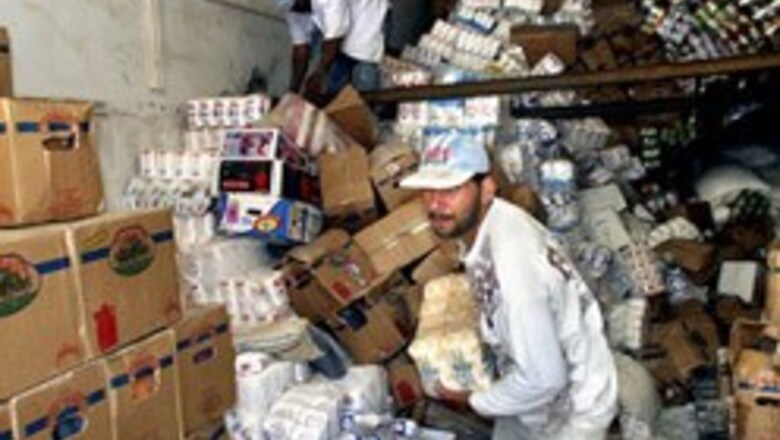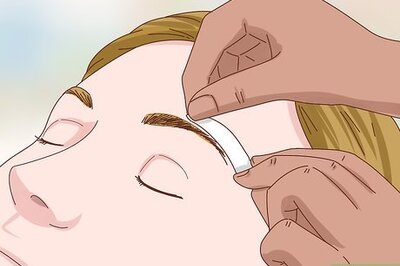
views
Kufr Ein, West Bank: Palestinian women in the West Bank are resorting to the cheapest methods to produce staples like bread as financial curbs on the Islamist Hamas government make it harder by the day for families to be fed.
At her home in the village of Kufr Ein, near Ramallah, Hind Ahmad, breaks bits of wood for a fire she is using to cook and bake bread in a makeshift clay oven in her yard.
It is not work the 52-year-old school principal is accustomed to, but having not been paid for more than two months, she cannot afford to make food in any other way.
"I have to use this primitive method to save money and feed my children," she said, her face flushing red and hot as she leans down to shove dough into the flaming oven.
"Every time I bake bread, my face turns as red as a tomato, not to mention being tired from inhaling the smoke."
Like 165,000 other Palestinians employed by the state, Ahmad, who as a senior teacher would normally make about 2,000 shekels ($450) a month, has not been paid since the Hamas-led government came to power in March.
Because the US and the EU consider Hamas a terrorist group, foreign donors and local and international banks are no longer transferring funds or financial aid to the Palestinian government, in part fearing US sanctions.
As a result, Hamas has virtually no income to run the government, which is already around $1.3 billion in debt.
The restrictions, which also include Israel withholding $55 million a month in tax revenues it collects on the Palestinians' behalf, threaten to strangle economic life in the West Bank and Gaza Strip, where 3.8 million people live.
PAGE_BREAK
Ahmad said she, her unemployed husband, two sons and a daughter had not eaten meat since March. She said she was relying on rice she had bought before and vegetables planted in her back yard.
Broke and desperate
While foreign powers mediating in the Middle East decided this week to set up a mechanism to channel some funds to the Palestinians, it is not clear when the mechanism will kick in or if it will be used to pay salaries.
Um Mohammad, another teacher in Kufr Ein, said the crisis had forced her to resort to wood as a source of energy to feed her eight children, two of whom are university students.
"I never cooked on wood and I am allergic to smoke but I have to save money in every way possible, no matter how primitive it is. This is my responsibility," she said, stirring a pot of chickpeas on a stone-made stove to make hummus.
In recent weeks, Palestinians in both the West Bank and Gaza have resorted to selling gold coins and bracelets—in the Arab world traditionally a person's last source of wealth, next to land—to try to get together enough money to buy food.
Um Mohammed said she was also thinking of selling her jewellery, although so far her parents and brothers were helping her make do with daily living expenses.
"I only want to see the kids graduate. Nothing more. In the village, we can live on land," she said.
The two women said some male colleagues from nearby villages had stopped using public transport to get to school and had started using their donkeys instead.
In the northern West Bank town of Nablus on Friday, several hundred people, many of them Hamas supporters, turned out at a rally to raise money for the Palestinian government.
Scores of people, including children carrying their piggy-banks, donated money, dropping it into cardboard boxes.
"We will overcome this financial crisis by depending on ourselves," Bassam Shaka, a former Nablus mayor, told the crowd.
"Our message when we donate these things is to show the Americans that we don't need their support, we will deal with our own problems."













Comments
0 comment